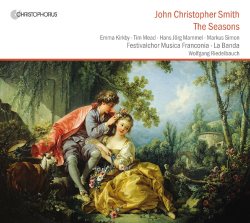| 
|
John Christopher SMITH (1712-1795)
The Seasons - An Oratorio (1740) [93:24]
Emma Kirkby (soprano); Tim Mead (counter-tenor); Hans Jörg Mammel (tenor); Markus Simon (bass)
Festivalchor Musica Franconia; La Banda/Wolfgang Ridelbauch
rec. live, St Sebald Church, Nürnberg, Germany, 14-15 July 2012
text and German translation included (sung in English)
CHRISTOPHORUS CHR77382 [39:43 + 53:41]
Johann Christoph Schmidt was born in Ansbach, the son of a wool merchant who was a friend of Handel. Handel persuaded his friend to move to London in 1716 and he was followed by the rest of the family in 1720. The boy changed his name to John Christopher Smith and worked with Handel from the age of thirteen. He became the latter’s amanuensis in his latter years, and after Handel’s death arranged two pastiche oratorios from a variety of his works. He is probably best known nowadays, at least by name, for the two operas he wrote based on Shakespeare to libretti by David Garrick: The Fairies and The Tempest. What we have here, however, is an even greater rarity – an oratorio based on James Thomson’s poem The Seasons which had been published in 1730.
Smith’s version of The Seasons is very different to that by Haydn which derives from the same source. It lacks any narrative content and is a setting of the final Hymn which follows the main body of the poem. Its message that the variety of the changing seasons illustrates the varying aspects of God allows a series of airs and choruses of suitably differing character. Smith seizes when he can of opportunities for illustrative effect, especially of birdsong, but for the most part the music is pleasant and enjoyable after the manner of Handel — of course — and even more of Arne. It would be an exaggeration to describe this as a lost masterpiece but for anyone interested in music of this period, especially British music, there is much to relish here.
The soloists do what they can for it, especially Emma Kirkby who sings with all the character and purity we expect from her. The orchestra, on period instruments, play with great spirit and finesse. The choir is less satisfactory, at least as recorded here. They sound muddy and their diction is unconvincing but this is not enough to detract from the overall impact of the work.
The full text is included in the booklet together with useful and interesting essays on the composer and the oratorio. This is a valuable addition to the catalogue, doing justice to a work previously barely even a footnote in musical history.
John Sheppard
 |
 |
|



 All Nimbus reviews
All Nimbus reviews








